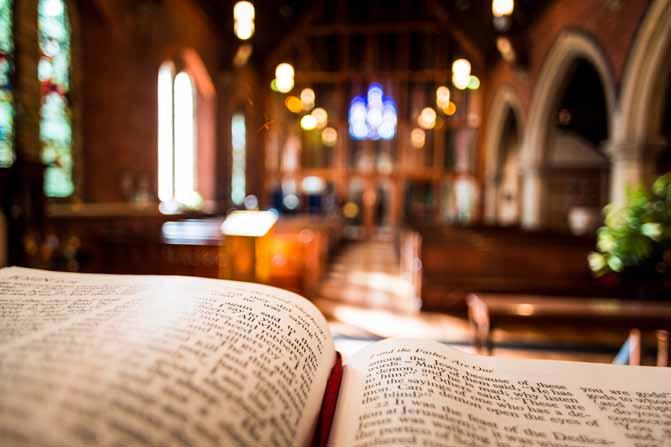
3 minute read
Liturgical Catechesis: The Readings and the Sermon
By Rev. William M. Cwirla
Since this is a special edition of Higher Things Magazine devoted to preaching, we’re going to do a little leap in our tour through the Divine Service and go straight for the Word: the Readings and the Sermon. From the grand opening of the New Testament Church at Pentecost, God’s baptized people, filled with the Spirit, have always gathered around the Word and the Lord’s Supper. Immediately after telling us about the events of Pentecost, Luke reports, “And they devoted themselves to the apostles’ teaching and the fellowship, to the breaking of bread and the prayers” (Acts 2:42, ESV). This has been Christian worship since the beginning: apostolic teaching, the Lord’s Supper, and prayer. It’s the same for us today. We hear God’s Word through Moses and the prophets, through our Lord’s apostles, and from the first Evangelists. And then we hear from the pastor whose job it is to deliver Christ from the Scriptures to our ears.
Advertisement
I have a book on my shelf from when I was in preaching class at the seminary. (The fancy word for preaching is homiletics, but for our purposes we’ll just stick with preaching.) The book is entitled "Preaching: The Art of Connecting God and People." You may not have thought about the pastor’s sermon that way before, but it’s a very good description of what he does for you. He connects God and you through the Word of God.
But couldn’t you just sit and read the Bible on your own? Do you need a sermon to connect you and God? Of course, you can, and should, read the Bible. But think about it for a moment. God isn’t speaking directly to you in the Bible. Some people think that He does, so you can randomly open your Bible anywhere, close your eyes and point your finger, and God will speak to you. You may read of God’s command to Israel to destroy the altars of Baal, tear down the sacred groves of Asherah, and wipe out the false religions and their idols from the land and decide God is speaking to you, so you vandalize a Buddhist temple. Not a good strategy, “biblical” though it might seem.

God is certainly speaking to you in His written Word, but He’s addressing you through the first hearers, that is, through ancient Israel, the band of disciples, and the first congregations. Paul’s letters aren’t specifically addressed to you. They are addressed to the Christians who were at Rome, Corinth, Galatia, Ephesus, Philippi, in the first century. But these words continue to speak to us today through the original hearers. The task of the preacher is to make you original hearers of the Word, to speak the Word of God into your contemporary ears so you may hear what they heard. Think of the sermon as the “for you” of the Word. The Scriptures are for Israel, for the early Church, and indeed, for the whole world. But the sermon is “for you.” It’s the same as in the synagogue at Nazareth when Jesus preached there, “Today, these Scriptures are fulfilled in your hearing” (Luke 4:21).
Our God is a preaching God. He preached all things into existence in the beginning and He continues to sustain and uphold all things by the same sermon of creation. He preached through Moses and the prophets, and through the apostles and Evangelists sent by Jesus. Jesus is the Word in Flesh, God’s sermon to the world. This is why God established the preaching office and why He calls and ordains men to preach today. God isn’t simply the God who spoke, but the God who speaks.
The Divine Service is a kind of table fellowship, a family meal. Can you imagine a meal in which no one talks? I’ve experienced that a few times at a local monastery as a kind of spiritual discipline. No one talks at the meal. All you hear are dishes, knives, forks, and the occasional burp. But even in that discipline of silence, there isn’t complete silence. During the meal, a brother reads something from the Church Fathers or some kind of devotion. There is a meal and there is the Word.
Teaching and meals always went together in the ancient world. At the Sabbath meal and at the annual Passover meal, there was teaching and a meal. Jesus spent a lot of time eating and drinking with people, so much so that His critics said He was a glutton and a drunkard. Whenever Jesus had a meal with people, He taught them.
That’s exactly what happens in the Divine Service. We are God’s children, gathered for table fellowship with God. And God teaches us through the Word read and preached just as He feeds us in the Meal of Jesus’ Body and Blood. As you hear the words “for you” when the pastor puts the Body and Blood of Christ into your mouth, so the sermon delivers the words of Holy Scripture into your ears with the same “for you.”
God is speaking to you through His Word! And faith says, “Speak Lord, for your servant is listening” (1 Samuel 3:10).
Rev. Cwirla is the pastor of Holy Trinity Lutheran Church in Hacienda Heights, California, as well as a president emeritus of Higher Things. Known for preaching and recognizing a good sermon when he hears it, he has elected to devote his regular spot to teach us how to be hearers of the Word preached!









